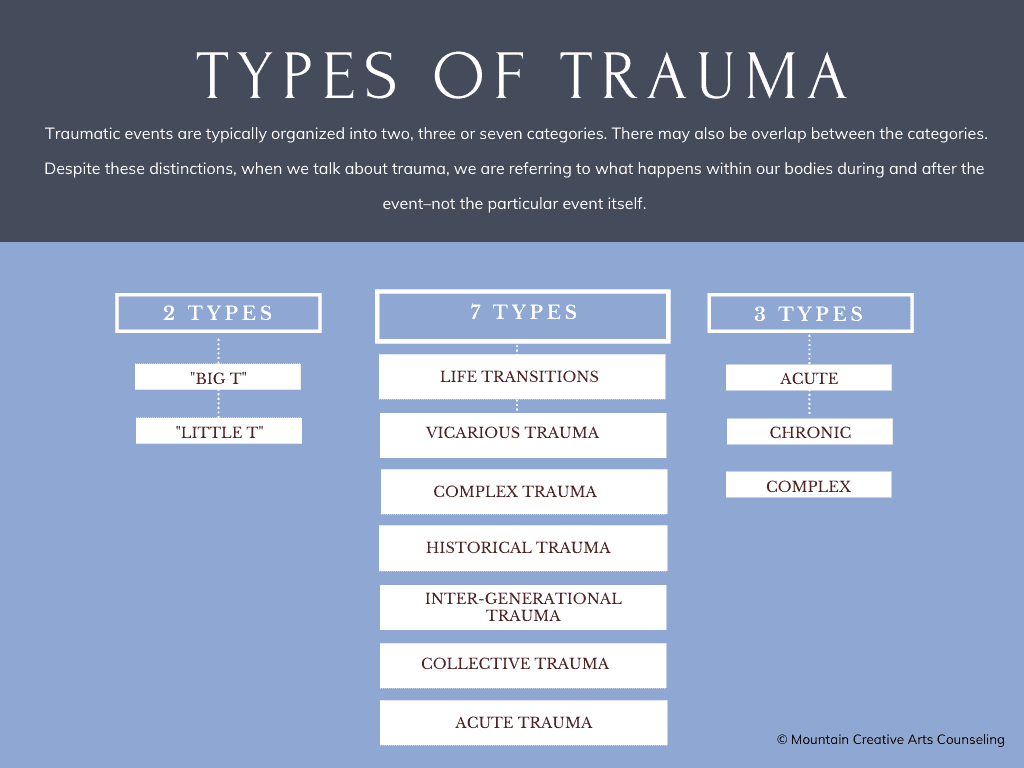In my previous post, I defined trauma and discussed the importance of trauma-informed counseling. In this post, I will provide a breakdown of the categories and types of traumatic events
Clinicians sometimes use the terms “Big T” and “Little T” to categorize traumatic events. Others may categorize these events as either acute, chronic, or complex. In the following paragraphs, I have broken down the various types of traumatic events and provided a few examples to help clarify these terms.
“Big T” Events
“Big T” events are typically considered acute, single-incident, and often life-threatening events like war, combat, natural disasters, physical or sexual abuse, terrorism, and catastrophic accidents. This category is sometimes called acute or shock trauma.
“Little T” Events
“Little T” events are non life-threatening events and transitions that many people experience, but still have an impact on the individual: the loss of a loved one or pet, moving to a new home, losing a job, divorce, etc. The impact of these “Little T” events is often dismissed in our society. However, they can profoundly change an individual’s ability to cope with stress. Additionally, the impact can increase when two or more of these events happen simultaneously or within a short period of time.
Complex Traumatic Events
Complex traumatic events are often experienced throughout the developmental stages of childhood and adolescence. We also use the term “complex trauma” to refer to repetitive or chronic traumatic experiences at any age. These experiences often involve interactions or relationships with another person and affects the individual’s ability to trust others and form healthy relationships. Examples of complex traumatic events include physical, verbal, emotional, and sexual abuse; domestic violence; physical & emotional neglect; and bullying at school or work.
Vicarious/Secondary Traumatic Events
Vicarious trauma results when you are indirectly exposed to a traumatic event. This can happen by listening to a story of someone’s experience or witnessing it second-hand through audio or video recordings. Those in the helping professions, journalists, friends, and family members can experience trauma vicariously through supporting or documenting those who experienced the traumatic event.
Historical Traumatic Events
Historical trauma is multi-generational trauma experienced by a specific cultural, racial or ethnic group. It is related to major events that oppressed a particular group of people because of their status as oppressed. Examples include the slavery of African Americans, the Holocaust, forced migration, internment of Japanese Americans during World War II, genocide, racism, war, and the colonization of Native Americans. Historical trauma can have an impact on psychological and physical health across multiple generations. Descendants of those who experienced a traumatic event can exhibit similar signs and symptoms of trauma, as those who experienced the event first-hand. A damaged cultural identity is often another result of historical trauma.
Inter-generational Traumatic Events
The effects of inter-generational traumatic events are similar to historical traumatic events. However, inter-generational trauma affects a single family across generations, versus an entire cultural group. When this trauma is untreated, the parent may pass it down to their children through the attachment bond and through beliefs and messaged about the child’s self in connection to the world, other people, safety, and danger.
Collective Traumatic Events
These events are experienced by a group of people, who may or not be of the same cultural, ethnic, racial, or familial group. These events affect the foundation of the society, city, or country in which they occur. Examples of collective trauma include the 9/11 terrorist attacks (and terrorist attacks,in general), mass shootings, pandemics (including the Covid-19 pandemic), war, economic crashes, natural disasters, nuclear disasters, and political revolutions. Additionally, all of the events listed in the historical trauma category would also be examples of collective traumatic events.

These examples of the types of traumatic events are not comprehensive, by any means. Again, trauma is not about the event itself; it’s about the impact that event has on you. With a certain combination of factors, even getting a paper cut can trigger a trauma response.
In my next post, I’ll share more about the effect these traumatic experiences can have on our nervous systems.
About the Author

Kara Ashley-Gilmore believes in the use of our innate creativity for our wellness and healing. She is a Licensed Clinical Mental Health Counselor, Registered Art Therapist, Somatic Experiencing Practitioner-in-Training, and a mixed-media artist at Mountain Creative Arts Counseling, in Hendersonville, NC. She provides individual and group psychotherapy and with individuals who feel crushed by the weight of their worries, dread their next panic attack, and live with overactive inner critics. Learn more about her work at www.mountaincreativearts.com.
